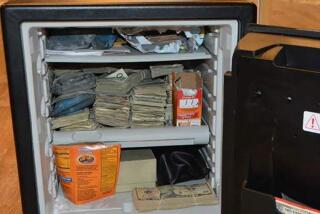Rome Court Convicts Chile Army Officers : Justice: Extradition for 1975 murder unlikely. Ex-secret police chief not yet jailed in Letelier case.
- Share via
SANTIAGO, Chile — Justice has not quite caught up with retired army Gen. Manuel Contreras, chief of the notorious secret police under this nation’s former military government. But an Italian court Friday increased his debt to society by 20 years.
The court convicted and sentenced Contreras, in absentia, for ordering a 1975 attempt to kill an exiled Chilean politician in Rome. In late May, Chile’s Supreme Court confirmed a seven-year sentence against Contreras for ordering the 1976 assassination of another Chilean exile in Washington, D.C.
But Contreras, 66, remained Friday in a Chilean naval hospital, where doctors say he is suffering from high blood pressure, diabetes and other ailments. A Chilean Supreme Court justice said Friday that he was ordering new medical evaluations next week to determine if the former general can be imprisoned.
Delays in carrying out the Chilean sentence have triggered tension between the civilian government and the army. Politicians have accused the army of helping to keep Contreras out of jail. Gen. Augusto Pinochet, the former military ruler who still commands the army, has called the trial of Contreras in Chile “unjust” but has said the army will respect the sentence.
The penal tribunal in Rome convicted Contreras for ordering the shooting of Bernardo Leighton and his wife as they left their Rome apartment in October, 1975. The couple recovered from their wounds and later returned to Chile, where Leighton died early this year. He was a Christian Democratic leader who served as interior minister and vice president in the late 1960s.
In the same case, the court handed down an 18-year sentence for retired Gen. Raul Eduardo Iturriaga, director of foreign operations in the secret police force headed by Contreras from 1974 to 1977. Neither of the two appeared or presented a defense in the proceedings.
The Italian verdict is subject to appeal, but even if it is confirmed, it appears unlikely that justice will be done. Italy and Chile have no treaty that would permit the extradition of Contreras and Iturriaga.
On May 30, the Chilean Supreme Court issued a final guilty verdict against Contreras for the car-bomb murder of Orlando Letelier, a Socialist and former Cabinet minister, on Washington’s Embassy Row. The attack also killed Ronni Moffitt, an American associate of Letelier.
Army Brigadier Pedro Espinoza, who was Contreras’ director of operations, received a six-year sentence in the Letelier case. The sentences confirmed a 1993 ruling by Supreme Court Justice Adolfo Banados.
*
Banados has been coordinating action aimed at carrying out the sentences. While Contreras holed up on his ranch in southern Chile, and Espinoza cloistered himself in the army’s communications center near Santiago, judicial paperwork delayed arrest orders for two weeks. On May 11, Contreras suddenly left his ranch and spent 11 hours in a nearby army barracks. Then, two days later, the army mobilized a convoy of motor vehicles in a diversionary operation while a helicopter secretly flew Contreras to the navy hospital near the coastal city of Concepcion.
Police tried to serve an arrest warrant on Contreras there, but doctors said he was too sick, and judicial regulations bar arrest if his health is at risk. So Banados ordered a series of examinations by the government’s legal medicine service.
When police tried to serve Espinoza’s arrest order, they had trouble locating his superior officer. Last Tuesday, Espinoza finally went to a new prison built especially for convicted military officers.
His arrest relieved a national case of jitters over what would happen if the army refused to turn over one of its officers. But some nervousness continued as Contreras remained in the naval hospital.
Friday, Justice Banados told reporters: “There will be no movement until the middle of next week, when a new medical evaluation will be requested.” He said the latest medical bulletins indicate that “this is not the time to move him.”
Contreras is said to have a hernia, and Banados said he may need an operation. But he said a “crisis” of high blood pressure and diabetes is more dangerous.
More to Read
Sign up for Essential California
The most important California stories and recommendations in your inbox every morning.
You may occasionally receive promotional content from the Los Angeles Times.












